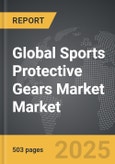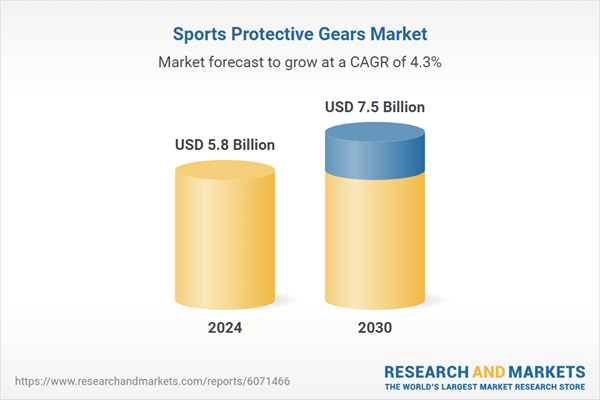Global Sports Protective Gear Market - Key Trends & Drivers Summarized
Why Is the Sports Protective Gear Market Witnessing Accelerated Growth Across All Levels of Play?
Sports protective gear has evolved from basic safety equipment to a high-performance, tech-integrated category that plays a critical role in athlete health, injury prevention, and competitive longevity. Whether in professional leagues, youth sports, or recreational activities, there is growing awareness about the short- and long-term consequences of sports-related injuries - especially concussions, fractures, ligament tears, and impact trauma. This heightened focus on athlete safety, combined with increased participation in contact and high-speed sports like football, hockey, rugby, motorsports, cycling, and extreme sports, is driving robust demand for protective gear such as helmets, pads, guards, mouthguards, and full-body suits. Government and league-mandated safety regulations are also reinforcing the use of certified gear across various levels of play, including school and collegiate sports. The rise in female sports participation, expansion of youth sports academies, and growing acceptance of recreational fitness activities like skateboarding, rollerblading, and martial arts are broadening the consumer base. With health and wellness becoming more central to lifestyle, parents, coaches, and athletes alike are placing greater emphasis on using the right protective equipment - not just to comply with regulations, but to sustain performance, reduce injury recovery times, and ensure long-term athletic development.How Are Material Innovation and Smart Technologies Elevating the Functionality of Protective Gear?
The sports protective gear market is undergoing a significant transformation driven by innovations in advanced materials, ergonomic design, and embedded technology. Manufacturers are moving beyond rigid plastics and foam padding to incorporate lightweight, impact-absorbing materials such as D3O, EVA, carbon fiber, and gel-based composites that offer better energy dispersion without compromising mobility. These next-gen materials adapt to the body's shape and harden upon impact, providing dynamic protection tailored to the sport and level of intensity. Enhanced breathability, moisture-wicking linings, antimicrobial treatments, and climate-responsive fabrics are being used to improve comfort, hygiene, and wearability. At the same time, smart technologies are being integrated into helmets and pads - such as sensors that monitor impact force and frequency, sending real-time data to coaches or medical personnel. This is especially vital in contact sports where concussion detection and return-to-play protocols are under increasing scrutiny. Wearable gear with built-in biometrics, GPS tracking, and motion analysis is also gaining traction, offering a dual function of protection and performance monitoring. These innovations not only improve athlete safety but also boost consumer confidence in investing in higher-end, premium protective gear that balances form, function, and smart features.Where Is Demand Growing Most Rapidly, and Which Sports and Demographics Are Fueling Expansion?
Demand for sports protective gear is rising across diverse geographies and age groups, with North America and Europe leading the market in terms of regulatory enforcement and product penetration. However, Asia-Pacific is emerging as the fastest-growing region, fueled by rapid urbanization, rising disposable incomes, increased sports participation, and growing public investment in athletic infrastructure. Countries like China, India, Japan, and South Korea are witnessing surging interest in football, cricket, martial arts, cycling, and e-sports-related gear. Among sports segments, American football, ice hockey, lacrosse, and motocross remain top users of full-body protective gear, while boxing, MMA, and taekwondo drive demand for headgear, gloves, and chest guards. Youth and teen demographics represent a particularly high-growth market, driven by increasing parental emphasis on injury prevention and school-level sports policies. Female athletes also represent a growing consumer base, prompting brands to design anatomically tailored protective gear for women across sports like field hockey, soccer, and baseball. Additionally, recreational users in fitness studios and extreme sports communities are contributing to demand for multi-purpose gear that combines protection with comfort and style. E-commerce platforms, influencer reviews, and online sports education content are playing a growing role in shaping purchasing decisions, expanding market reach, and raising awareness about the importance of proper gear selection.What's Driving the Long-term Growth of the Sports Protective Gear Market Globally?
The growth in the sports protective gear market is driven by a blend of safety awareness, regulatory alignment, demographic expansion, and technological evolution. One of the core drivers is the increased institutional and parental focus on preventing sports injuries, especially concussions and overuse injuries in youth athletes. Regulatory bodies, sports leagues, and educational institutions are implementing stricter mandates for the use of certified protective gear, thereby driving consistent demand across all age categories and skill levels. The integration of smart sensors and IoT capabilities into helmets and pads is creating a new frontier in real-time athlete monitoring, enabling faster injury response and more informed medical decisions. Rising consumer interest in performance-optimized products - those that offer both protection and athletic mobility - is encouraging R&D investment into advanced composites, bioadaptive materials, and data-enhanced protective systems. The growing popularity of women's sports, inclusivity in athletic programs, and the social normalization of safety gear in recreational environments are broadening the market's user base. Furthermore, the increased availability of customizable, sport-specific gear through e-commerce channels is simplifying access and encouraging adoption, particularly in emerging economies. As awareness grows around injury prevention and athlete welfare, the sports protective gear market is expected to remain on a robust growth trajectory - serving as a vital enabler of safe, inclusive, and performance-driven sport across the globe.Report Scope
The report analyzes the Sports Protective Gears market, presented in terms of market value (US$). The analysis covers the key segments and geographic regions outlined below:- Segments: Type (Helmets, Shoulder Guards, Elbow Guards, Shin Guards, Knee Pads, Wrist Guards, Spinal Vest, Other Types); Sports Type (Skiing, Skating, Cycling, Soccer, Rock Climbing / Mountaineering, Other Sports Types); Protection Area (Head & Face Protection, Trunk & Thorax Protection, Upper Extremity Protection, Lower Extremity Protection); Distribution Channel (Pharmacy & Drug Stores Distribution Channel, Supermarket & Hypermarket Distribution Channel, Specialty Stores Distribution Channel, E-Commerce Distribution Channel).
- Geographic Regions/Countries: World; United States; Canada; Japan; China; Europe (France; Germany; Italy; United Kingdom; Spain; Russia; and Rest of Europe); Asia-Pacific (Australia; India; South Korea; and Rest of Asia-Pacific); Latin America (Argentina; Brazil; Mexico; and Rest of Latin America); Middle East (Iran; Israel; Saudi Arabia; United Arab Emirates; and Rest of Middle East); and Africa.
Key Insights:
- Market Growth: Understand the significant growth trajectory of the Helmets segment, which is expected to reach US$2.2 Billion by 2030 with a CAGR of a 5.9%. The Shoulder Guards segment is also set to grow at 3.4% CAGR over the analysis period.
- Regional Analysis: Gain insights into the U.S. market, valued at $1.6 Billion in 2024, and China, forecasted to grow at an impressive 8.2% CAGR to reach $1.6 Billion by 2030. Discover growth trends in other key regions, including Japan, Canada, Germany, and the Asia-Pacific.
Why You Should Buy This Report:
- Detailed Market Analysis: Access a thorough analysis of the Global Sports Protective Gears Market, covering all major geographic regions and market segments.
- Competitive Insights: Get an overview of the competitive landscape, including the market presence of major players across different geographies.
- Future Trends and Drivers: Understand the key trends and drivers shaping the future of the Global Sports Protective Gears Market.
- Actionable Insights: Benefit from actionable insights that can help you identify new revenue opportunities and make strategic business decisions.
Key Questions Answered:
- How is the Global Sports Protective Gears Market expected to evolve by 2030?
- What are the main drivers and restraints affecting the market?
- Which market segments will grow the most over the forecast period?
- How will market shares for different regions and segments change by 2030?
- Who are the leading players in the market, and what are their prospects?
Report Features:
- Comprehensive Market Data: Independent analysis of annual sales and market forecasts in US$ Million from 2024 to 2030.
- In-Depth Regional Analysis: Detailed insights into key markets, including the U.S., China, Japan, Canada, Europe, Asia-Pacific, Latin America, Middle East, and Africa.
- Company Profiles: Coverage of players such as ALS Limited, AOAC International, Banned Substances Control Group (BSCG), Biofortis (a Mérieux NutriSciences company), BioReference Laboratories and more.
- Complimentary Updates: Receive free report updates for one year to keep you informed of the latest market developments.
Some of the 44 companies featured in this Sports Protective Gears market report include:
- Adidas AG
- Alpinestars S.p.A.
- Amer Sports
- ASICS Corporation
- Bauer Hockey, LLC
- BRG Sports
- D3O Lab
- Dainese S.p.A.
- Franklin Sports Inc.
- Harrow Sports Inc.
- McDavid Inc.
- Mizuno Corporation
- Mueller Sports Medicine, Inc.
- Nike, Inc.
- PUMA SE
- Schutt Sports
- TSG International AG
- Under Armour, Inc.
- Vista Outdoor
- Xenith, LLC
This edition integrates the latest global trade and economic shifts into comprehensive market analysis. Key updates include:
- Tariff and Trade Impact: Insights into global tariff negotiations across 180+ countries, with analysis of supply chain turbulence, sourcing disruptions, and geographic realignment. Special focus on 2025 as a pivotal year for trade tensions, including updated perspectives on the Trump-era tariffs.
- Adjusted Forecasts and Analytics: Revised global and regional market forecasts through 2030, incorporating tariff effects, economic uncertainty, and structural changes in globalization. Includes historical analysis from 2015 to 2023.
- Strategic Market Dynamics: Evaluation of revised market prospects, regional outlooks, and key economic indicators such as population and urbanization trends.
- Innovation & Technology Trends: Latest developments in product and process innovation, emerging technologies, and key industry drivers shaping the competitive landscape.
- Competitive Intelligence: Updated global market share estimates for 2025, competitive positioning of major players (Strong/Active/Niche/Trivial), and refined focus on leading global brands and core players.
- Expert Insight & Commentary: Strategic analysis from economists, trade experts, and domain specialists to contextualize market shifts and identify emerging opportunities.
Table of Contents
Companies Mentioned (Partial List)
A selection of companies mentioned in this report includes, but is not limited to:
- Adidas AG
- Alpinestars S.p.A.
- Amer Sports
- ASICS Corporation
- Bauer Hockey, LLC
- BRG Sports
- D3O Lab
- Dainese S.p.A.
- Franklin Sports Inc.
- Harrow Sports Inc.
- McDavid Inc.
- Mizuno Corporation
- Mueller Sports Medicine, Inc.
- Nike, Inc.
- PUMA SE
- Schutt Sports
- TSG International AG
- Under Armour, Inc.
- Vista Outdoor
- Xenith, LLC
Table Information
| Report Attribute | Details |
|---|---|
| No. of Pages | 503 |
| Published | February 2026 |
| Forecast Period | 2024 - 2030 |
| Estimated Market Value ( USD | $ 5.8 Billion |
| Forecasted Market Value ( USD | $ 7.5 Billion |
| Compound Annual Growth Rate | 4.3% |
| Regions Covered | Global |









